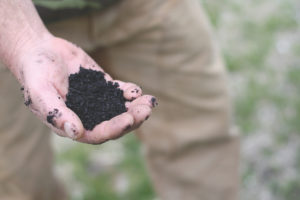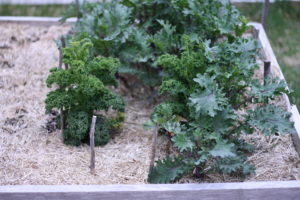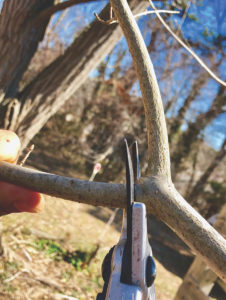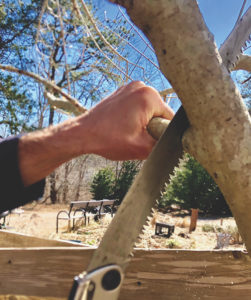Outer Cape gardeners can get restless counting the days until they can safely set out their tomato seedlings. But seasoned local growers have some advice on what to do right now: work on soil building.

Wellfleet gardener Andrew Cummings has been growing in raised beds for several decades. “If you’re building a new bed, dig down into the earth and pack the bottom of the bed with tons of salt hay,” he recommended. “You’ll reap the rewards for 10 or 15 years.” Salt marsh hay helps beds retain moisture and slows down the loss of water and nutrients through the sand.
Eastham resident Bob Wells has been studying ways to preserve fertility in our sandy soil for over a decade, after learning about an ancient soil amendment called biochar. (See also this week’s front-page story on farming.) Biochar is a charcoal-like substance created by burning wood, brush, or leaves in a controlled process called pyrolysis. The result is about 70 percent carbon.
It came to the attention of farmers in the U.S. after scientists reported on areas of super-rich soil in the Amazon basin. “They realized these were manmade soils,” said Wells, and that they were made by adding a kind of charcoal along with food scraps and shards of pottery. Wells traveled to the Amazon to see the so-called “terra preta,” or “black earth,” for himself in 2010, after co-founding his company, New England Biochar.
Peter Staaterman of Longnook Meadow Farm in Truro first heard about biochar when he began growing locally over 10 years ago.
“I was searching for a way to make it possible for whatever nutrients I was putting in not to wash away, and I was very frustrated,” he said. He learned Wells was not just creating ready-to-use biochar, but also building machines that people could use to make their own. Staaterman purchased one and now produces enough to meet the needs of his farm.
“Biochar doesn’t decay like compost,” Wells said. “It changes the way the soil acts and the way it hosts microorganisms and plants.”
This is important, explained Staaterman, because healthy soil is less about adding fertilizer and more about creating a healthy microbiome. “The thing about soil that most people don’t understand is that plants don’t really consume fertilizer,” said Staaterman. “They consume the byproducts of bacterial action — basically bacteria poop.”
In addition to biochar, Cummings recommends mixing existing soil with amendments of aged manure from horses or chickens, a general soil conditioner, and compost, with more targeted add-ins if you’re growing specific plants.

For tomatoes, for instance, Epsom salts can provide a boost in overall health. “I just sprinkle a ring around the base, say six inches from the stem,” said Cummings, who credits the abundant minerals in the salts with fighting off blights and preventing tomato skins from splitting. He also saves the racks and skins from fish he catches whole and fillets at home. He freezes all the trimmings and bones in a bag until he’s ready to plant. Then he buries a little beneath each tomato.
Eastham turnips are another crop that can require extra attention. “I was having a problem that a lot of people call hollow heart,” said Staaterman, “where there’s an air space inside the root.” The culprit turned out to be a boron deficiency, apparently common on the Outer Cape. “You can add boron back but it can be dangerous — a tiny bit goes a long way, and if you put too much in it becomes a poison for the plants,” Staaterman added, though through careful research he was able to find the right balance.
Nearly every seasoned grower recommends getting a soil test. But testing for pH levels through the Cape Cod Cooperative Extension and complete nutrient analyses through the Soil and Plant Tissue Testing Lab at UMass have been suspended because of the coronavirus crisis.
“Soil can be complicated, but that shouldn’t deter anyone from trying to learn,” said Staaterman. Cummings added, “If you don’t want to worry about your soil, plant strawberries.” For them, he said, our sandy soil is just perfect.


